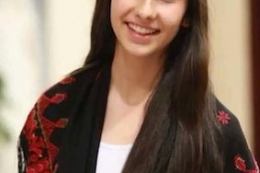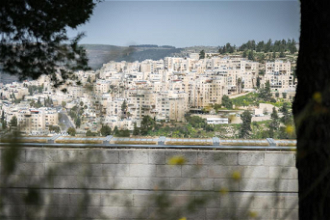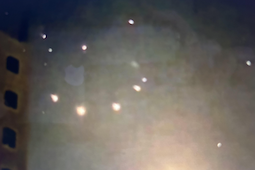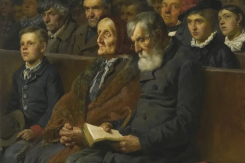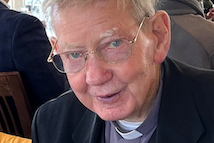Pope Benedict visits hospital, refugee camp in West Bank

Partition Wall, Bethlehem (picture by CPT)
Source: VIS
Pope Benedict visited the main religious sites around Bethlehem, as well as a children's hospital and a refugee camp during his brief visit to the West Bank on Wednesday and Thursday.
After Mass in Manger Square the Pope spent a short time in the Basilica and the Grotto of the Nativity in Bethlehem. From here he moved on to the Caritas Baby Hospital, which is supported by the German and Swiss episcopal conferences. Before greeting staff, and the Franciscan Elizabethan Sisters of Padua who help care for the patients, the Pope visited the chapel and the maternity ward.
Addressing some words to the young patients and their families, he said: "The Pope is with you! Today he is with you in person, but he spiritually accompanies you each and every day in his thoughts and prayers, asking the Almighty to watch over you with His tender care.
"Fr Schnydrig (the hospital's founder) described this place as 'one of the smaller bridges built for peace'. Now, having grown from fourteen cots to eighty beds, and caring for the needs of thousands of children each year, this bridge is no longer small! It brings together people of different origins, languages and religions, in the name of the Reign of God, the Kingdom of Peace. I heartily encourage you to persevere in your mission of showing charity to all thesick, the poor and the weak".
Today being the Feast of Our Lady of Fatima, the Holy Father concluded by invoking the Virgin Mary in these terms: "May love triumph over hatred, solidarity over division, and peace over every form of violence!" And he concluded: "We ask your Son Jesus to bless these children and all children who suffer throughout the world".
Pope Benedict's next stop was the Aida refugee camp in Bethlehem. The camp is one of the refugee camps in the Palestinian Territories, which house a total of 1,300,000 refugees who arrived in two waves: in 1948 with the birth of the State of Israel, and in 1967 following the Six-Day War.
Aida which is described as an example of co-existence between Christians and Muslims, houses some 5,000 people, including a number of Christian families.
In his remarks, the Pope expressed his "solidarity with all the homeless Palestinians who long to be able to return to their birthplace, or to live permanently in a homeland of their own". He also praised the work of UNRWA officials in this camp and others throughout the region.
Benedict XVI stressed the importance of education and called on young people present to "renew your efforts to prepare for the time when you will be responsible for the affairs of the Palestinian people". He also called on parents "to support your children in their studies and to nurture their gifts, so that there will be no shortage of well-qualified personnel to occupy leadership positions in the Palestinian community in the future.
"I know", he added, "that many of your families are divided - through imprisonment of family members, or restrictions on freedom of movement - and many of you have experienced bereavement in the course of the hostilities. ... Please be assured that all Palestinian refugees across the world, especially those who lost homes and loved ones during the recent conflict in Gaza, are constantly remembered in my prayers".
The Holy Father also praised the work of Church agencies in the Palestinian Territories, such as the Pontifical Mission for Palestine, the Franciscan Missionary Sisters of the Immaculate Heart of Mary who "call to mind the charismatic figure of St Francis, that great apostle of peace and reconciliation", and the Franciscan family in general which cares "for the people of these lands, by making themselves 'instruments of peace'".
"How much the people of this camp, these Territories, and this entire region long for peace! In these
days, that longing takes on a particular poignancy as you recall the events of May 1948 and the years of conflict, as yet unresolved, that followed from those events. You are now living in precarious and difficult conditions, with limited opportunities for employment.
"It is understandable that you often feel frustrated. Your legitimate aspirations for permanent homes, for an independent Palestinian State, remain unfulfilled. Instead you find yourselves trapped, as so many in this region and throughout the world are trapped, in a spiral of violence, of attack and counter-attack, retaliation, and continual destruction. The whole world is longing for this spiral to be broken, for peace to put an end to the constant fighting. Towering over us, as we gather here this afternoon, is a stark reminder of the stalemate that relations between Israelis and Palestinians seem to have reached - the wall.
"In a world where more and more borders are being opened up - to trade, to travel, to movement of peoples, to cultural exchanges - it is tragic to see walls still being erected. How we long to see the fruits of the much more difficult task of building peace! How earnestly we pray for an end to the hostilities that have caused this wall to be built!
"On both sides of the wall, great courage is needed if fear and mistrust is to be overcome, if the urge to retaliate for loss or injury is to be resisted. It takes magnanimity to seek reconciliation after years of
fighting. Yet history has shown that peace can only come when the parties to a conflict are willing to move beyond their grievances and work together towards common goals, each taking seriously the concerns and fears of the other, striving to build an atmosphere of trust. There has to be a willingness to take bold and imaginative initiatives towards reconciliation: if each insists on prior concessions from the other, the result can only be stalemate".
Benedict XVI emphasised the fact that humanitarian aid, is essential "but the long-term solution to a conflict such as this can only be political. No one expects the Palestinian and Israeli peoples to arrive at it on their own. The support of the international community is vital, and hence I make a renewed appeal to all concerned to bring their influence to bear in favour of a just and lasting solution, respecting the legitimate demands of all parties and recognising their right to live in peace and dignity, in accordance with international law. Yet at the same time, diplomatic efforts can only succeed if Palestinians and Israelis themselves are willing to break free from the cycle of aggression".
The Holy Father concluded with a plea "for a profound commitment to cultivate peace and non-violence, following the example of St Francis and other great peacemakers. Peace has to begin in the home, in the family, in the heart. I continue to pray that all parties to the conflict in these lands will have the courage and imagination to pursue the challenging but indispensable path of reconciliation. May peace flourish once more in these lands! May God bless His people with peace!"
Having concluded his address Benedict XVI travelled to the presidential palace in Bethlehem to pay a courtesy visit to Mahmoud Abbas, president of the Palestinian National Authority on Wednesday evening. He thanked President Abbas for his hospitality and "for the great kindness you have shown me".
Referring then to the separation wall, the Pope said that "although walls can easily be built, we all know that they do not last forever. They can be taken down. First, though, it is necessary to remove the walls that we build around our hearts, the barriers that we set up against our neighbours.
"That is why", he added, "in my parting words, I want to make a renewed plea for openness and generosity of spirit, for an end to intolerance and exclusion. ... There are always grounds to hope that conflict can be resolved, that the patient and persevering efforts of those who work for peace and reconciliation will bear fruit in the end. My earnest wish for you, the people of Palestine, is that this will happen soon, and that you will at last be able to enjoy the peace, freedom and stability that have
eluded you for so long".
Benedict XVI gave assurances that he will continue "to take every opportunity to urge those involved in peace negotiations to work towards a just solution that respects the legitimate aspirations of Israelis and Palestinians alike. As an important step in this direction, the Holy See looks forward to establishing shortly, in conjunction with the Palestinian Authority, the Bilateral Permanent Working Commission that was envisioned in the Basic Agreement, signed in the Vatican on 15 February 2000".



